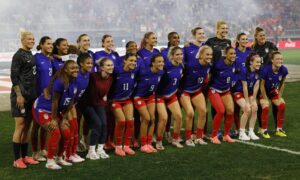The Olympics is the pinnacle of athletics, and a competition that every child grows up imagining themselves partaking in.
This year’s crop of American talent left for Tokyo with lofty expectations and prospective champions littered throughout the roster. While most are still waiting to compete, there have been plenty of wins and losses that have already befallen the United States.
Aside from the obvious competition and enticing spectacle, the Olympics also bring extreme pressure to athletes, the likes of which will never be known to most spectators, or even other Olympians.
Certain competitors, like Simone Biles, receive more attention than others, and as the world is now seeing, even the most dominant champions are human at their core.
Simone Biles Withdraws from Competing
Biles, 24, has been on the Olympic team since she was 15-years old; she has won four Olympic Gold Medals, 19 World Championship Golds, four silvers, four bronzes, and has four skills named after her. She is still extremely young, but she is already widely considered to be the greatest gymnast of all time.
For all of her incredible accomplishments, however, Biles announced Wednesday that she had withdrawn from the individual all-around competition just one day after she removed herself from the team final, following one rotation on vault.
In an emotional press conference after the team event, Biles cited her mental health as the main reason for her decision.
“I just felt like it would be a little bit better to take a back seat, work on my mindfulness,” said Biles. “I didn’t want to risk the team a medal for kind of my screwups, because they’ve [her teammates] worked way too hard for that.”
American Olympians Prioritize Mental Health
This decision is the latest and greatest example of an athlete prioritizing their mental well-being amidst a serious competition, following a precedent that has been established by athletes in different professional sports— Olympic medal leader Michael Phelps, NBA Champion Kevin Love, and World Cup-winner Andres Iniesta being a few.
As hard as it is to deal with expectations of any kind, carrying the weight of the world is a different type of pressure; Phelps himself struggled with this burden ahead of the 2016 Rio Olympics and sought clinical help before he was able to return to prominence.
“I struggled with anxiety and depression and questioned whether or not I wanted to be alive anymore,” Phelps said in a 2019 Tweet. “It was when I hit this low that I decided to reach out and ask for the help of a licensed therapist. This decision ultimately helped save my life. You don’t have to wait for things.”
Given Phelps’ admission of mental instability during his career, it came as little surprise when he stuck up for Biles and her decision after it hit the mainstream media.
“We [athletes] carry a lot of things, a lot of weight on our shoulders, and it’s challenging,” said Phelps. “Mental health, over the last 18 months, is something that people are talking about.”
Biles’ teammates expectedly supported her decision, and many athletes rose to defend her from public criticism for dropping out of the biggest athletic competition in the world.
Her struggle with mental health is not a newfound struggle that was manufactured overseas, either; Biles infamously fell victim to sexual predation and molestation from Team USA doctor Larry Nassar, has competed and won titles with broken toes, and has accomplished more at 24 than most athletes ever do in their lifetimes.
Naomi Osaka, another American Olympian, joined Biles in championing the prioritization of mental health. Osaka, the face behind the “It’s O.K. to not be O.K.” movement, pulled out of competitions earlier this year for similar reasons and was fully understanding of the 24-year-old gymnast’s decision.
Continuing the Trend
American Olympians prioritize mental health over pure competitiveness. This dedication towards mental health improvement is not unique to young millennials or members of Generation Z, either; Michael Jordan took time away from basketball, citing the murder of his father as the preemptive reason that he lost interest in the game of basketball.
“What my father’s death made me realize is how short life is, and how it can be taken from you in a minute,” said Jordan.
While America may not have been calling this a mental health break, the truth of the matter is that the fiercest competitor and champion in American sports history wanted some time off to be with his family, and to rediscover his humanity, no different from what Biles and others are doing.
So the next time that an athlete says that they are struggling, or they need help, or they want to improve themselves before they focus on anything else, remember these words from DeMar DeRozan, a four-time NBA All-Star.
“No matter how indestructible we look like we are, we’re all human at the end of the day.”
The women’s individual all-around gymnastics event will commence Thursday at 6:50 a.m. ET.









